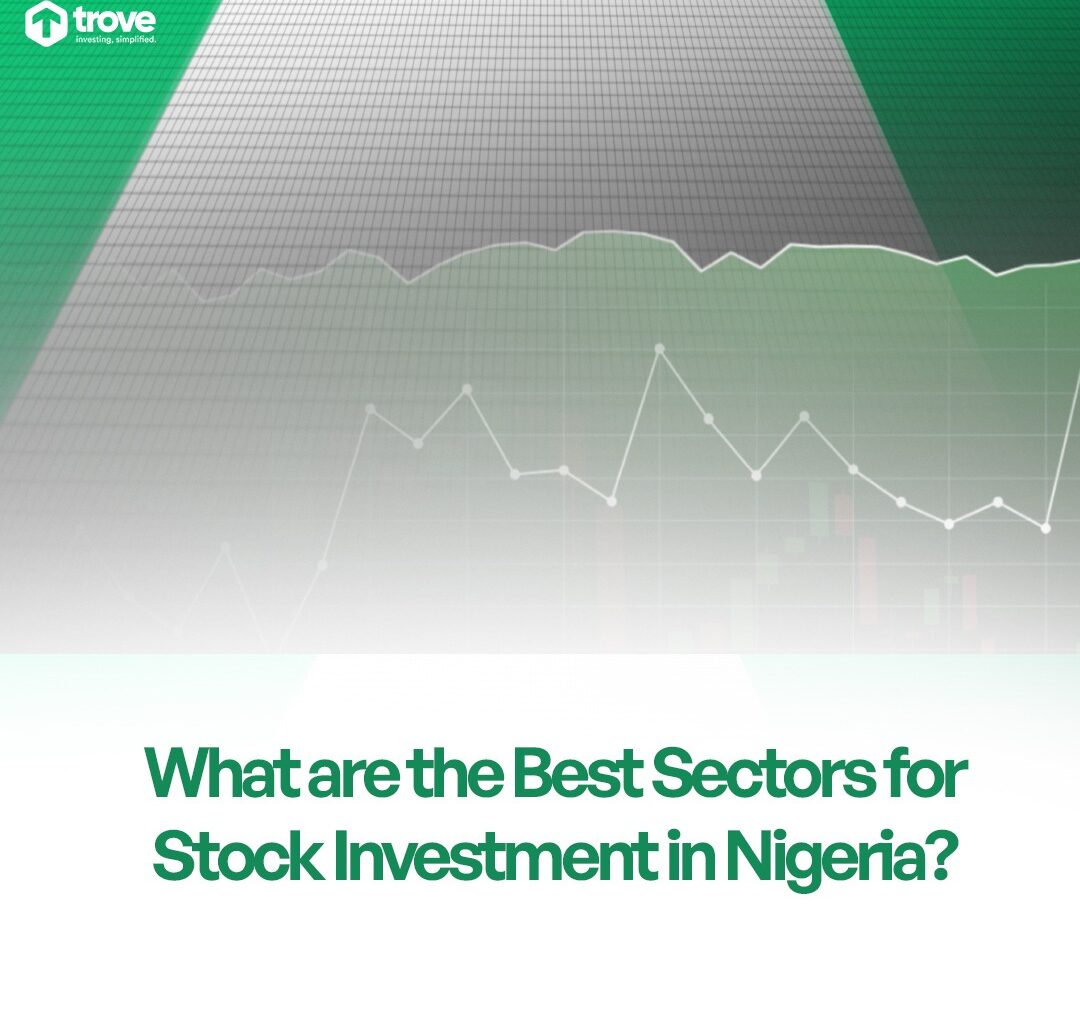As an investor, you must understand that not all sectors are equal. Some industries are the life of the party—buzzing with opportunities and growth—while others are quieter, slower, and often overshadowed. If you’re just starting your investment journey or simply want to diversify, knowing which sectors to consider is your first step to making informed choices.
In this post, I won’t tell you where to invest—after all, your goals, risk tolerance, and time horizon are unique to you. Instead, I’ll walk you through some of the best-performing and most promising sectors in Nigeria.
What Makes a Sector Worth Considering?
Before we dive in, let’s talk about what makes a sector stand out in the stock market. I look at a few key factors:
- Contribution to Nigeria’s Economy: Is the sector a heavy hitter, contributing significantly to GDP or employment?
- Resilience: How well does it withstand economic challenges, like recessions or policy shifts?
- Growth Potential: Is the sector expanding, introducing innovation, or benefiting from changing consumer trends?
- Government Support: Are there policies or incentives boosting the sector? With that in mind, let’s explore some of the sectors that could be worth your attention.
What are Sectors or Areas I Could Choose to Invest in?
1. Banking and Financial Services
It’s no surprise that the financial sector is one of the most vibrant in Nigeria’s stock market. Think of banks like Zenith Bank or GTCO—they’ve not only weathered economic storms but have also maintained profitability.
Banking stocks are often a favorite for dividend-focused investors because of their regular payouts. So, if you’re looking for stability with a touch of growth, this might be a sector to consider.
2. Agriculture
Nigeria’s agricultural sector is growing, thanks to increased focus on food security and export potential. Companies in this space are expanding operations and benefiting from government initiatives.
While not as flashy as tech or telecom, agriculture offers a steady, long-term investment option.
3. Oil and Gas
Oil and gas still dominate Nigeria’s economy, even as we diversify. From giants like Seplat to smaller players, this sector can be lucrative, especially when global oil prices rise.
However, it’s not without risks—price volatility and environmental concerns are worth keeping in mind.
4. Telecommunications
With over 200 million people and growing internet penetration, telecom is booming. MTN Nigeria and Airtel are giants in this space, and they’re not just about voice calls anymore—they’re heavily involved in digital services, fintech, and data.
This sector is great for anyone looking to ride the wave of digital transformation.
5. Technology and Fintech
Although still emerging, Nigeria’s tech sector is making waves globally. Companies like eTranzact are proof that tech isn’t just the future—it’s already here. If you’re into high-growth, high-risk plays, tech might be worth exploring.
6. Consumer Goods
Fast-Moving Consumer Goods (FMCGs) like beverages, snacks, and household products are always in demand. With Nigeria’s population growing, companies like Nestlé and Dangote Sugar are positioned to thrive. If you’re looking for stocks tied to everyday essentials, this sector could be your sweet spot.
Risks and Challenges You Should Keep in Mind
Of course, no sector is perfect. The stock market comes with its share of risks, and sector-specific investments are no exception. Here are a few to watch out for:
- Economic Volatility: Some sectors, like oil and gas, are more sensitive to global price changes.
- Policy Shifts: Regulations can change overnight, impacting sectors like agriculture or fintech.
- Company-Specific Issues: Even in strong sectors, individual companies can face challenges like poor management or declining demand.
How Do I Choose a Sector to Invest in?
Choosing a sector to invest in requires a mix of research, personal goals, and an understanding of the broader market landscape. Here are some key steps to help you decide which sector might be right for you:
1. Define Your Investment Goals
Start by asking yourself, What am I hoping to achieve with my investment?
- Income Generation: Are you looking for steady income through dividends? Sectors like banking, telecommunications, or consumer goods might fit this goal, as they often offer reliable returns.
- Capital Appreciation: If you’re after growth and the potential for your investment to increase in value over time, you may want to consider sectors like technology or oil and gas, where there’s more potential for expansion (though at higher risk).
- Stability or Growth: Do you prefer a safer, more stable investment, or are you willing to take on more risk for higher potential returns? For instance, agriculture and FMCGs tend to be more stable, while technology and fintech can offer faster growth with more volatility.
2. Understand the Sector’s Performance
Look at how the sector has performed historically, as well as its potential for future growth.
- Growth Potential: Consider sectors that are on the rise or have room for growth. Tech, fintech, and telecommunications, for example, are benefiting from global digital trends.
- Historical Performance: Some sectors, like oil and gas, may offer strong returns when market conditions are favorable, but can also experience high volatility when prices fluctuate. Look at how stocks in the sector have performed over the past few years to get a sense of its stability.
- Economic Cycles: Some sectors are more sensitive to economic cycles. For example, consumer goods tend to be more resilient during downturns, while luxury goods or real estate may struggle.
3. Research Sector-Specific Risks
Every sector has its own set of risks, and understanding these is crucial for making an informed decision.
- Government Policies: Sectors like agriculture or fintech can be impacted by regulatory changes or government interventions. For instance, government incentives for farming or renewable energy might make those sectors more attractive.
- Market Saturation: Some sectors, like telecommunications or banking, may be nearing saturation, which could limit growth. This is something to consider if you’re looking for aggressive expansion opportunities.
- Global or Local Trends: Global oil price fluctuations, for example, could heavily affect the oil and gas sector. Similarly, growing interest in digital payments can boost fintech stocks.
4. Evaluate the Companies within the Sector
Once you’ve narrowed down a few sectors, look at the companies within those sectors considering the following:
- Industry Leaders: Consider the major players in the sector. Are they strong, stable companies, or are there concerns about their management or financial health?
- Growth Stories: Are there any promising startups or smaller companies within the sector that have the potential to grow rapidly? Sometimes emerging companies within a sector outperform their larger counterparts.
- Dividend or Capital Gains: Depending on your goal, you might prioritize companies offering regular dividends (often in the banking or FMCG sectors) or companies with high growth potential (such as in tech or telecommunications).
5. Consider Diversification
Diversifying across multiple sectors can help reduce your risk. You don’t have to choose just one sector—many investors spread their investments across different sectors to balance growth and risk. For instance, you might allocate some funds to more stable sectors (like banking or consumer goods) and others to high-growth sectors (like technology or oil and gas).
6. Analyze Market Trends and News
Stay informed about current events, policy changes, and market trends. For example, Nigeria’s push for diversification beyond oil is making sectors like agriculture, fintech, and renewable energy increasingly attractive. Keeping up with local and global news can help you spot emerging sectors before they hit the mainstream.
7. Assess Your Risk Tolerance
Finally, reflect on how much risk you’re comfortable with. If you’re risk-averse, you might lean toward stable, well-established sectors like banking or consumer goods. If you’re open to higher risk for the chance of greater returns, you might look into sectors like technology, fintech, or even oil and gas.
Remember, platforms like Trove Finance make it easy to access stocks across various sectors, so you can tailor your portfolio to what works for you.

Read Also: What Does Compounding Mean in Investing
Conclusion
Nigeria’s stock market is as diverse as its culture. Whether it’s the stability of banking, the innovation of tech, or the everyday demand for consumer goods, there’s something for every investor. The key is figuring out what aligns with your goals and doing your homework before diving in.
At the end of the day, investing isn’t about chasing trends—it’s about making choices that set you up for the future you envision. So, explore these sectors, weigh your options, and take that first step toward building your portfolio.




